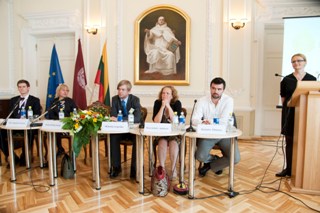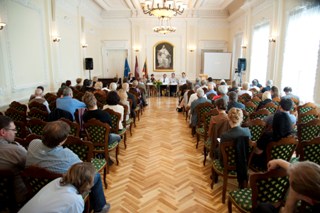Education and Science, Forum, Lithuania
International Internet Magazine. Baltic States news & analytics
Tuesday, 16.04.2024, 22:44
Symposium session at Vitautas Uni discussed emigrant youth’s ties to homeland
 Print version
Print version |
|---|
Prof. Auksė Balčytienė, the VMU Vice-Rector for Public Communication and a lecturer at the Dept. of Public Communications, and Mykolas Lepeška, the Director of the International non-profit organisation Global Lithuanian Leaders, moderated the discussion. First speaker of the session was Vida Bagdonavičienė, the coordinator of the Vytautas Magnus University‘s project entitled the Lithuanian Diaspora Academy. Drawing on the political theories of migration, the head of the project reminded the audience that the relations between emigrants and their native country came into focus of the governments around the world in the beginning of the 1970s.
Afterwards, the scholar spoke about the situation in Lithuania, noting that the communication between the country’s politicians and the Lithuanian diaspora is seriously harmed by the created negative image of the latter. “Strange requests often appear in the public sphere, and in politicians’ speeches in particular, for the emigrants to return, to do something in the name of Lithuania. There have even been proposals to prohibit people from leaving Lithuania for some time after graduating from the university. These proposals remind me of a Georgian joke that contains the phrase “Why do you need the address, just come like that”. Requests for the skilled emigrants to return have no addressee. The activities of the Lithuanian Diaspora Academy, on the other hand, have provided almost all inquirers with some kind of an answer, continuity”, Vida Bagdonavičienė explained before naming the essential goals of the organisation and stressing that all of them are being successfully implemented.
Communication is the key
The session was continued by Kęstutis Pikūnas, the President of the World Lithuanian Youth Association (WLYA) in the United Kingdom. He emphasised that not all emigrants belong to world Lithuanian communities, and remembered how he looked for the way to unite all youth of the diaspora, which is quite large in numbers: the WLYA in the UK alone, according to its president, is one of the largest and most active communities. However, the conclusion was reached that it is impossible to unite everyone due to the large scale of the community. Keeping the ties strong, according to Pikūnas, is something that is still not completely grasped: “It is an interesting time. After Lithuania became the member of the European Union, many people left and only now begin to realize where they stand and whether Lithuania can give them anything or they can give anything to Lithuania”, he said.
Speaking about the image of a world Lithuanian in the homeland, the guest mentioned the often negative readers’ comments in the online media: “They say we are laundering Lithuania’s money when in fact it is all from our own pocket. Sometimes you just throw your hands up – does this work have a purpose, is there any continuity, because you talk with ministries and various organisations and see that their priorities are different. In my opinion, it is not all bad. Just like everywhere, the minority often speaks for the majority. I am a restless optimist and believe that the work by VMU and all the organisations is very necessary, it is only a matter of time before it all rises to the surface”, Pikūnas said. He concluded that the key here is communication, the desire to communicate and discuss, which makes one realize it is not hopeless and there still are people who are working hard in this field – there are no grounds for pessimistic talks about the disappearance of the Lithuanian nation.
Building the Future Lithuania
 |
|---|
Another speaker of the symposium, Karolis Adomaitis, previously headed the Lithuanian Youth Association in the United Kingdom (JKLJS) uniting 3000 young people and implemented numerous successful projects. “Our organisation has accumulated a large network of contacts because students who graduate from universities find work in the largest companies of the world and acquire experience there. If we lost contact with them, their contribution to the future of Lithuania would equal zero. This is why the World Lithuanian Youth Association is working and nurturing this bond, striving for the young people living abroad to be able to contribute to the building of the future of Lithuania”, Adomaitis explained.
As the talk shifted to the particular projects carried out by the association, Karolis Adomaitis first spoke about Lietuvos Ateitis (Future of Lithuania): successful businessmen, scholars and representatives of other fields arrive from Lithuania to meet with the Lithuanian emigrant youths in the United Kingdom and hold discussions. Another project, JKLJS Praktika (JKLJS Internship) allows students to come to Lithuania and do internship in various companies; special internship programs, adapted for those coming from the United Kingdom, are created together with companies’ representatives. Many participants receive job offers and stay to work in Lithuania.
Youth Needs No Encouragement
Rasa Ardys-Juska, Vice President at the National Executive Committee of the Lithuanian American Community and the Director of the LISS summer internship program for Lithuanian emigrant students, presented the latter program in her speech at the symposium. The LISS program, sponsored by the Lithuanian American Community and VMU, offers Lithuanian-heritage students studying in the USA to come and do internship in their homeland. Rasa Ardys-Juska reminded the audience that an agreement was signed in 2010 with VMU and the program was expanded, allowing even the students who cannot speak Lithuanian to apply. “The advantage is that they not only do internship of their specialty, but also improve their Lithuanian language, knowledge, culture. It is hard work, because we do not just bring students, we talk to them everyday, check whether the employers understand what the youth want. The results of the internship? Some decided to stay in Lithuania and seek a Master’s degree. Young people saw what the life is like in Lithuania and understood that they can experience a lot in here while they are still young. They become interested on their own – I need not do anything. On the first year of the program, the participants told each other about LISS via social networks and other channels”, the head of the internship program said.
This internship, which has attracted no less than 50 young people from Canada and the USA this year, is one of the best examples of retaining the ties between Lithuanians living abroad and their fellow countrymen staying in the homeland, Rasa Ardys Juska explained. “It is wonderful. While their Lithuanian language skills are not great, they are trying hard and working every day. I think that the connection towards the home country nurtured by American and Canadian Lithuanians is inherent, natural. They want very much to not just contribute in Lithuania but show that they consider themselves equal Lithuanians”, the Director of LISS program emphasised.
Also speaking at the symposium was the Director of the Global Lithuanian Leaders, Mykolas Lepeška, who explained the main goals of his organisation: “We gather professionals who have achieved a lot in their careers, bankers, financial consultants, etc., so that they would help young people looking for work in these occupations, tell them about the undercurrents in a particular field, help them prepare for a job interview. It is an opportunity to use the experience of a person who has come a long way in the same profession. We encourage young people to leave, acquire experience, then come back and use it”, Lepeška said. In his opinion, there is not enough space in Lithuania for people to take on challenges in various fields, for instance, musicians who would like to perform on an international level: world-class virtuoso Edvinas Minkštimas, for instance, is performing in New York and would have a lot fewer places to hold concerts in Lithuania, thus becoming unable to improve. By collaborating with VMU, he seems to be returning the favour to Lithuania and helping the VMU Music Academy by using the experience he has gained abroad.
Contacts Bring Success
Concluding the speakers’ remarks, the discussion’s moderator Prof. Auksė Balčytienė, the VMU Vice-Rector for Public Communication and a lecturer at the Public Communications Dept., noted that there is not one singular diaspora but multiple Lithuanian diaspora communities. “We live in a complicated, networked world, which we have to learn to recognise and discover, find how to join it and take part”, Prof. Balčytienė said. Another important aspect, according to the Vice-Rector, is contacts. “Success is in the contacts, communication, social networks, social interaction and the ways of building trust in one another. We all have social relations, some of us build strong and very proximate ones, with closest friends and family, others prefer more flexible, simpler and not as strong relations. Practice has shown that people who establish ties of both kinds – sometimes highly personal and very professional at other times – have the possibility of being happier. It has always been vital to have friends, but in these times more than ever the Internet and social networks facilitate the established communication, preserve the bonds”, Prof. Balčytienė told the symposium audience.
A communication specialist, lecturer of journalism, Prof. Auksė Balčytienė also discussed the negativity prevalent in the media: “I am dissatisfied with many things, but I think that the Internet provides both the media and us with many opportunities. What is the most interesting to us as readers online, what encourages us to collect data? Let us agree: it is unexpected projects, unexpected ideas. There is a shortage of this in the media – it is not enough to just supply the facts. The most important thing nowadays is the connections between people. People’s biographies and ideas, suggestions by artists should be presented alongside the facts. All of this does not come through in our media, culture has been pushed to the sidelines, art is not often encountered in the Lithuanian press. But all of this can be achieved on blogs, works of art, the artists’ introductions online. Also, perhaps this way we could inspire representatives and practicians of journalism”, the professor of the VMU Public Communication Dept. said at the end of the discussion.








 «The Baltic Course» Is Sold and Stays in Business!
«The Baltic Course» Is Sold and Stays in Business!

